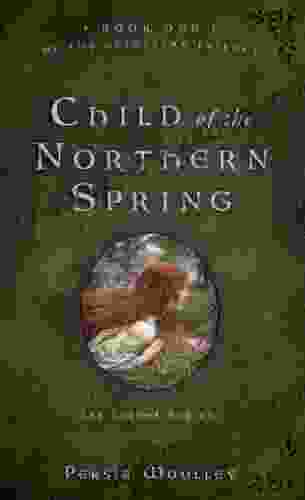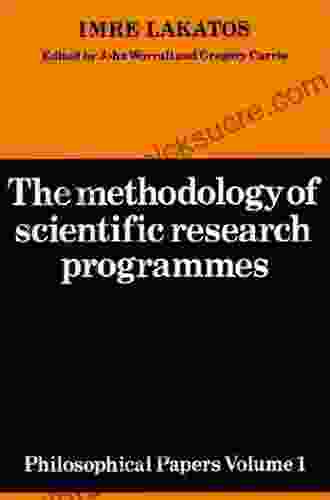The Methodology of Scientific Research Programmes

The methodology of scientific research programmes is a framework for understanding the structure and dynamics of scientific research. It was developed by Imre Lakatos in the 1960s and 1970s as a response to the logical positivism of the Vienna Circle. Lakatos argued that logical positivism was too narrow and that it could not account for the actual practice of science. He proposed instead a more flexible and dynamic approach that would allow for the possibility of scientific progress.
4.2 out of 5
| Language | : | English |
| File size | : | 36840 KB |
| Screen Reader | : | Supported |
| Print length | : | 256 pages |
Lakatos's methodology of scientific research programmes has been influential in a wide range of fields, including philosophy of science, sociology of science, and history of science. It has also been used to develop new approaches to teaching and learning science.
The Structure of Scientific Research Programmes
A scientific research programme consists of a hard core of theories and a protective belt of auxiliary hypotheses. The hard core is the central core of the programme that is not subject to falsification. The protective belt consists of auxiliary hypotheses that can be modified or replaced in order to protect the hard core from falsification. The protective belt also includes methodological rules that guide the research process.
Lakatos argued that scientific research programmes are not static entities. They are constantly evolving and changing as new evidence is gathered and new theories are developed. The hard core of a programme may remain stable for a long period of time, but the protective belt is constantly being modified and replaced.
The Dynamics of Scientific Research Programmes
The dynamics of scientific research programmes are driven by the tension between the hard core and the protective belt. As new evidence is gathered, the protective belt may be modified or replaced in order to protect the hard core from falsification. This process of modification and replacement is known as progressive problem shifts.
Progressive problem shifts can lead to the development of new theories and the refinement of existing theories. However, they can also lead to the degeneration of a research programme. If the protective belt becomes too thick or if the hard core becomes too rigid, then the programme may no longer be able to accommodate new evidence. This is known as degenerating problem shifts.
The Evaluation of Scientific Research Programmes
Lakatos proposed a number of criteria for evaluating scientific research programmes. These criteria include:
- Empirical progressiveness: The programme must be able to explain new evidence and make new predictions.
- Theoretical progressiveness: The programme must lead to the development of new theories and the refinement of existing theories.
- Explanatory power: The programme must be able to explain a wide range of phenomena.
- Fruitfulness: The programme must be able to generate new research questions and lead to new discoveries.
Lakatos argued that scientific research programmes should be evaluated on the basis of their overall performance over time. He rejected the idea that a single experiment or observation could definitively falsify a programme. Instead, he argued that programmes should be evaluated on the basis of their ability to generate new knowledge and explain new phenomena.
The methodology of scientific research programmes is a powerful framework for understanding the structure and dynamics of scientific research. It provides a flexible and dynamic approach that can account for the actual practice of science. Lakatos's methodology has been influential in a wide range of fields and it continues to be used to develop new approaches to teaching and learning science.
Further Reading
- The Methodology of Scientific Research Programmes by John Worrall in the Stanford Encyclopedia of Philosophy
- The Methodology of Scientific Research Programmes by Imre Lakatos
- The Methodology of Scientific Research Programmes: Volume 1 by Imre Lakatos
4.2 out of 5
| Language | : | English |
| File size | : | 36840 KB |
| Screen Reader | : | Supported |
| Print length | : | 256 pages |
Do you want to contribute by writing guest posts on this blog?
Please contact us and send us a resume of previous articles that you have written.
 Fiction
Fiction Non Fiction
Non Fiction Romance
Romance Mystery
Mystery Thriller
Thriller SciFi
SciFi Fantasy
Fantasy Horror
Horror Biography
Biography Selfhelp
Selfhelp Business
Business History
History Classics
Classics Poetry
Poetry Childrens
Childrens Young Adult
Young Adult Educational
Educational Cooking
Cooking Travel
Travel Lifestyle
Lifestyle Spirituality
Spirituality Health
Health Fitness
Fitness Technology
Technology Science
Science Arts
Arts Crafts
Crafts DIY
DIY Gardening
Gardening Petcare
Petcare Ron Rhodes
Ron Rhodes Wendy Moore
Wendy Moore Miyamoto Musashi
Miyamoto Musashi Mark Mayfield
Mark Mayfield One Exam Prep
One Exam Prep Phil G Tang
Phil G Tang Benedict Go
Benedict Go Bryson Payne
Bryson Payne Kevin Callan
Kevin Callan George Hincapie
George Hincapie Ann Imig
Ann Imig Paul Twitchell
Paul Twitchell Je Earl
Je Earl Beth Cavenaugh
Beth Cavenaugh Namit Arora
Namit Arora Peter Wacht
Peter Wacht Elissa Altman
Elissa Altman Dick Pobst
Dick Pobst Dominique Pearson
Dominique Pearson Jack O Connor
Jack O Connor Fred Heath
Fred Heath Jean Paul Pequegnot
Jean Paul Pequegnot Victoria Clarke
Victoria Clarke Robert Edelman
Robert Edelman Jena Pincott
Jena Pincott Judy Goodspeed
Judy Goodspeed Stewart Pearce
Stewart Pearce Imogen Barnacle
Imogen Barnacle Donovan Buck
Donovan Buck David M Gitlitz
David M Gitlitz Guy Deutscher
Guy Deutscher Susanne Elizabeth Freidberg
Susanne Elizabeth Freidberg J W Lynne
J W Lynne Joe Fox
Joe Fox Reed Mangels
Reed Mangels Aditya Chatterjee
Aditya Chatterjee Elizabeth Wayland Barber
Elizabeth Wayland Barber Kit Deslauriers
Kit Deslauriers Lara Maiklem
Lara Maiklem Peter Liljedahl
Peter Liljedahl Chris Matakas
Chris Matakas Dorothy Roberts
Dorothy Roberts Brian Burke
Brian Burke Emiko Jean
Emiko Jean Ann Cameron
Ann Cameron Vivienne Crow
Vivienne Crow Don Jose Ruiz
Don Jose Ruiz Charlene Beswick
Charlene Beswick Tabatha Yeatts
Tabatha Yeatts Deborah Reber
Deborah Reber Bruce Gregor Hodge
Bruce Gregor Hodge Rc Blakes Jr
Rc Blakes Jr Robin Barrett
Robin Barrett Bruce Ackerberg
Bruce Ackerberg Erin Davis
Erin Davis Tami Oldham Ashcraft
Tami Oldham Ashcraft Willie Mosconi
Willie Mosconi Josh Kaufman
Josh Kaufman Paul Hough
Paul Hough Chad Wesley Smith
Chad Wesley Smith Frank Mastini
Frank Mastini Marley Hall
Marley Hall Behrouz Moemeni
Behrouz Moemeni Gavin Atkin
Gavin Atkin Cathy Glass
Cathy Glass Jennifer Harvey
Jennifer Harvey Antonia Malchik
Antonia Malchik Karl Deisseroth
Karl Deisseroth Discover Press
Discover Press Gina Atencio Maclean Psyd
Gina Atencio Maclean Psyd Kate Bowler
Kate Bowler Susie Albert Miller
Susie Albert Miller Sherman Dickinson
Sherman Dickinson Emma Hansen
Emma Hansen Daniel Harman
Daniel Harman Lindsey Hutchinson
Lindsey Hutchinson Brian Hayden
Brian Hayden Nikki Goth Itoi
Nikki Goth Itoi Sharan B Merriam
Sharan B Merriam Paul Eng
Paul Eng Emile Durkheim
Emile Durkheim Lisa Hoehn
Lisa Hoehn Julius Evola
Julius Evola Ray Bergman
Ray Bergman Ann Israel
Ann Israel Ed Robinson
Ed Robinson Illustrated Edition Kindle Edition
Illustrated Edition Kindle Edition David Deming
David Deming Waysun Liao
Waysun Liao Mayur Movalia
Mayur Movalia Dr Gareth Moore
Dr Gareth Moore Rachel Levin
Rachel Levin Colin Rees
Colin Rees Ann Mariah Cook
Ann Mariah Cook Chuck Robbins
Chuck Robbins Frederick Lewis Allen
Frederick Lewis Allen Ann Leary
Ann Leary Sharon N Covington
Sharon N Covington Alex Bonham
Alex Bonham Evelyn Monahan
Evelyn Monahan Marc Roche
Marc Roche Bob Stegner
Bob Stegner Brook Waters
Brook Waters J L Heilbron
J L Heilbron Lori Morrison
Lori Morrison Oswald Rivera
Oswald Rivera Clayton Geoffreys
Clayton Geoffreys Jade Mckenzie Stone
Jade Mckenzie Stone Mari Silva
Mari Silva Sean Deveney
Sean Deveney Thomas Thompson
Thomas Thompson Max Kuhn
Max Kuhn Anita Cortez
Anita Cortez Simon Boulter
Simon Boulter Eric Wargo
Eric Wargo Jason Rosenhouse
Jason Rosenhouse L A Cotton
L A Cotton Erling Kagge
Erling Kagge Richard J Davidson
Richard J Davidson Stephanie Garber
Stephanie Garber Baby Professor
Baby Professor Johnny Molloy
Johnny Molloy Deena Kastor
Deena Kastor Philip P Massaro
Philip P Massaro Shonda Schilling
Shonda Schilling Joshua Glenn
Joshua Glenn Ryan Tandler
Ryan Tandler Hippocrates
Hippocrates Brian Smith
Brian Smith Ania G
Ania G Mia Collins Parker
Mia Collins Parker Terry Leiden
Terry Leiden Angelo Tropea
Angelo Tropea Ann Chamberlin
Ann Chamberlin Anita Knight Kuhnley
Anita Knight Kuhnley Brian Platzer
Brian Platzer Michael Harner
Michael Harner Scott Douglas
Scott Douglas Eric Hanauer
Eric Hanauer Megan Hallett
Megan Hallett Susan Zimmermann
Susan Zimmermann Myron Mixon
Myron Mixon Shirley Maclaine
Shirley Maclaine D J Taylor
D J Taylor Michael S A Graziano
Michael S A Graziano Larry Mueller
Larry Mueller Tracy Wolff
Tracy Wolff Sharon Cameron
Sharon Cameron Joshua Straub
Joshua Straub Ann Marie Brown
Ann Marie Brown John Heart
John Heart Clinton Bailey
Clinton Bailey Sarah Albee
Sarah Albee Scott Cunningham
Scott Cunningham Warren Berger
Warren Berger Jack El Hai
Jack El Hai F C Yee
F C Yee Eliot Cowan
Eliot Cowan Elena Delle Donne
Elena Delle Donne Karen Lynch
Karen Lynch Doug Cook
Doug Cook Al Goldis
Al Goldis Dale Peterson
Dale Peterson Kevin Robbins
Kevin Robbins Judith A Muschla
Judith A Muschla Kristin Knight Pace
Kristin Knight Pace Julie Knutson
Julie Knutson Terry Hill
Terry Hill Robert G Bugge
Robert G Bugge Robert Jervis
Robert Jervis Benjamin T Mast
Benjamin T Mast Steven Dillon
Steven Dillon Richard Weaver
Richard Weaver Julian Guthrie
Julian Guthrie M K Hume
M K Hume John Novosel
John Novosel James Campbell
James Campbell Jim Grimsley
Jim Grimsley R H Charles
R H Charles Molly Harper
Molly Harper Kristen S Kurland
Kristen S Kurland Nick Clausen
Nick Clausen Neil Smith
Neil Smith Natale Barca
Natale Barca Emma Anne Bellamy
Emma Anne Bellamy Lisa Gardner
Lisa Gardner Frank Falcinelli
Frank Falcinelli Peter Lee
Peter Lee Val Waldeck
Val Waldeck Janet Patkowa
Janet Patkowa John Krige
John Krige Robin Esrock
Robin Esrock Lindsey Fitzharris
Lindsey Fitzharris William H Parker
William H Parker Frances Gies
Frances Gies Angie Papple Johnston
Angie Papple Johnston Katherine Nichols
Katherine Nichols Emily Teeter
Emily Teeter William J Ray
William J Ray Roasted Rat
Roasted Rat Jeff Deters
Jeff Deters Sandra Steingraber
Sandra Steingraber Stephen G Post
Stephen G Post Kenneth Wilgus Phd
Kenneth Wilgus Phd Cindy Hudson
Cindy Hudson Michael Yessis
Michael Yessis Eric Alpenfels
Eric Alpenfels James Freeman
James Freeman Dr Mike Dilkes
Dr Mike Dilkes Deborah J Bennett
Deborah J Bennett Quinn Loftis
Quinn Loftis Tabatha Chansard Phd
Tabatha Chansard Phd Marck Vaisman
Marck Vaisman 2nd Edition Kindle Edition
2nd Edition Kindle Edition Jeff A Johnson
Jeff A Johnson Tennille Chaffin
Tennille Chaffin Barry Correia
Barry Correia Peter Galison
Peter Galison Yuri Kitayama
Yuri Kitayama Tim Guest
Tim Guest Jeff Driscoll
Jeff Driscoll David J Lieberman
David J Lieberman Angie Thomas
Angie Thomas Stu Ingraham
Stu Ingraham Dick Crouser
Dick Crouser Scott Keyes
Scott Keyes Phoenix Nature
Phoenix Nature Jean Rose
Jean Rose Sarah J Tracy
Sarah J Tracy Ray Dozier
Ray Dozier Helen Czerski
Helen Czerski Rebecca M Warner
Rebecca M Warner John Monyjok Maluth
John Monyjok Maluth Laurie R King
Laurie R King Elliott Mendelson
Elliott Mendelson Mike Lowery
Mike Lowery Bill Fowler
Bill Fowler Dean Karnazes
Dean Karnazes Mary Helen Bowers
Mary Helen Bowers Steve Economides
Steve Economides Jenny Carr
Jenny Carr Jerry C Whitaker
Jerry C Whitaker Jan Witkowski
Jan Witkowski Steph Davis
Steph Davis Dickie Bird
Dickie Bird Len Kravitz
Len Kravitz Thomas Lewis
Thomas Lewis Gary Sutherland
Gary Sutherland Peter Feinman
Peter Feinman Buster Holmes
Buster Holmes Felice Benuzzi
Felice Benuzzi Ariel Dalfen
Ariel Dalfen Jason Aaron
Jason Aaron Jane Goodall
Jane Goodall Patricia Ann Lynch
Patricia Ann Lynch Rico Austin
Rico Austin Gail Carriger
Gail Carriger Laura M Ahearn
Laura M Ahearn Elwyn Hayes
Elwyn Hayes Stanley Vestal
Stanley Vestal Michael Deshotels
Michael Deshotels Julie Gianelloni Connor
Julie Gianelloni Connor Jessica Hall
Jessica Hall Darlene D Pedersen
Darlene D Pedersen Frank X Sutman
Frank X Sutman John Brockman
John Brockman Chris Dombrowski
Chris Dombrowski Nicholaos Kehagias
Nicholaos Kehagias Jean Molesky Poz
Jean Molesky Poz Little Mat
Little Mat Kumiko Makihara
Kumiko Makihara Marissa Zwetow Lmft
Marissa Zwetow Lmft Richard Paul Evans
Richard Paul Evans Judy Cannato
Judy Cannato Laurence Gonzales
Laurence Gonzales Sara Zaske
Sara Zaske Rebecca Rolland
Rebecca Rolland Max M Houck
Max M Houck Steph Jagger
Steph Jagger T Chris Riley Tillman
T Chris Riley Tillman Michele Caputo
Michele Caputo Tim Kimmel
Tim Kimmel Sue C Funnell
Sue C Funnell Gordon Forbes
Gordon Forbes Vicki Lansky
Vicki Lansky Oliver Horovitz
Oliver Horovitz Beth Berry
Beth Berry Scholastic
Scholastic Douglas Axe
Douglas Axe Mark Chang
Mark Chang Sharlene Healy
Sharlene Healy Ann Bingham
Ann Bingham Jeremy Griffith
Jeremy Griffith Tim Leffel
Tim Leffel Martin L Kutscher
Martin L Kutscher Douglas Turkington
Douglas Turkington Bob Greene
Bob Greene Sean Parker Dennison
Sean Parker Dennison Joshua Wright
Joshua Wright Tracy Salcedo
Tracy Salcedo Sadie Word
Sadie Word Damo Mitchell
Damo Mitchell Jon G Hughes
Jon G Hughes James A Fain
James A Fain Brent E Turvey
Brent E Turvey Joe Shuber
Joe Shuber Steven Cowie
Steven Cowie Paul Volponi
Paul Volponi Kalman Samuels
Kalman Samuels Jenna Tinsley
Jenna Tinsley Tom Mole
Tom Mole Chris Townsend
Chris Townsend Dan Hicks
Dan Hicks Paul Fowler
Paul Fowler Daxton Wilde
Daxton Wilde Imre Lakatos
Imre Lakatos Sankofa Ra
Sankofa Ra Tina Payne Bryson
Tina Payne Bryson Scott Haugen
Scott Haugen Nicholas Wade
Nicholas Wade Michael Edelson
Michael Edelson Grant Mcomie
Grant Mcomie Ryan Boudreaux
Ryan Boudreaux Anja Beran
Anja Beran Mark Wilson
Mark Wilson Kaylind Olson
Kaylind Olson Ann Cook
Ann Cook Sara Dykman
Sara Dykman Hugh Harris
Hugh Harris Joanna Nylund
Joanna Nylund Rae Brewer
Rae Brewer Robison Wells
Robison Wells Paul Vachon
Paul Vachon Robert A Sadowski
Robert A Sadowski Dale Grdnic
Dale Grdnic Anthony Castrovince
Anthony Castrovince Paul Stewart
Paul Stewart Cynthia Miller Idriss
Cynthia Miller Idriss Enrique Desmond Arias
Enrique Desmond Arias James Nickells
James Nickells Michael Easter
Michael Easter Stan Lee
Stan Lee Don Larsen
Don Larsen David Robert Grimes
David Robert Grimes Shane Frederick
Shane Frederick Ann Douglas
Ann Douglas Ray Walker
Ray Walker Isla Gordon
Isla Gordon Ann Bausum
Ann Bausum Tahereh Mafi
Tahereh Mafi Shannon Philpott Sanders
Shannon Philpott Sanders William Lee
William Lee Gary Robert Muschla
Gary Robert Muschla Tom Dokken
Tom Dokken Marke Bieschke
Marke Bieschke Graham Allcott
Graham Allcott Rosanne S Mchenry
Rosanne S Mchenry Daniel Paolicchi
Daniel Paolicchi Simon Winchester
Simon Winchester Justin Mcelroy
Justin Mcelroy Stephane Cazeault
Stephane Cazeault Bookrags Com
Bookrags Com Jim Burris
Jim Burris Rob Kelley
Rob Kelley Jody Vasquez
Jody Vasquez Peter Croker
Peter Croker Brianna Madia
Brianna Madia Tyler Feder
Tyler Feder Will Murray
Will Murray Rick Clark
Rick Clark Nancy Ellen Abrams
Nancy Ellen Abrams Comni S Art Publishing
Comni S Art Publishing Emily R King
Emily R King Joan Didion
Joan Didion Nouaoui Khedidja
Nouaoui Khedidja J M Gregson
J M Gregson Angie Stanton
Angie Stanton Presh Talwalkar
Presh Talwalkar Poul Anderson
Poul Anderson Christina Tosch
Christina Tosch Martina Sprague
Martina Sprague Art Clepper
Art Clepper Carl J Pratt
Carl J Pratt Bill Bishop
Bill Bishop Sarah Pink
Sarah Pink Janet Renner
Janet Renner David Roche
David Roche Julie Cwikla Phd
Julie Cwikla Phd Jessica Redland
Jessica Redland Jennifer Dugan
Jennifer Dugan Magnus D Jango
Magnus D Jango Sean Vigue
Sean Vigue Christof Koch
Christof Koch Shannon Greenland
Shannon Greenland William S Frisbee Jr
William S Frisbee Jr Wade Bourne
Wade Bourne Samuel G Puryear
Samuel G Puryear Tanya Holland
Tanya Holland Henry A Giroux
Henry A Giroux Michael Kranish
Michael Kranish Marc Weissbluth M D
Marc Weissbluth M D Lisa Charlebois
Lisa Charlebois Julie Watson
Julie Watson Eugene Hecht
Eugene Hecht Intisar Khanani
Intisar Khanani Jennie Germann Molz
Jennie Germann Molz Terry Tempest Williams
Terry Tempest Williams Anjeanette Carter
Anjeanette Carter Nims Purja
Nims Purja Kathy Fray
Kathy Fray Russ Mitchell
Russ Mitchell Richard Karban
Richard Karban Wendy Lyons Sunshine
Wendy Lyons Sunshine Christina Mcghee
Christina Mcghee Anil Ananthaswamy
Anil Ananthaswamy Miles Cameron
Miles Cameron Norman Hall
Norman Hall Jazmine Mccoy
Jazmine Mccoy Kim Loraine
Kim Loraine Sherrie Eldridge
Sherrie Eldridge Cgp Books
Cgp Books John Romer
John Romer John J Kaag
John J Kaag Beth A Grosshans
Beth A Grosshans Vera Snow
Vera Snow Johnegreek
Johnegreek Pete Earley
Pete Earley Shel Banks
Shel Banks Ben Magid
Ben Magid Nick Schade
Nick Schade Michelle Hercules
Michelle Hercules Tri Thong Dang
Tri Thong Dang Becky Choi
Becky Choi Elisa S Amore
Elisa S Amore Laurie Varga
Laurie Varga John Feinstein
John Feinstein Sadie Lake
Sadie Lake Ava Richardson
Ava Richardson Joshua Slocum
Joshua Slocum Peter Julius Sloan
Peter Julius Sloan Edward B Fiske
Edward B Fiske Karen Jettmar
Karen Jettmar J Budziszewski
J Budziszewski Alana Ash
Alana Ash David Poyer
David Poyer Felicity Aston
Felicity Aston Kamran Nazeer
Kamran Nazeer David J Wallin
David J Wallin Jada Fisher
Jada Fisher Shalane Flanagan
Shalane Flanagan Flor M Salvador
Flor M Salvador Elizabeth G Harper
Elizabeth G Harper Henny Bogan
Henny Bogan Tony Butt
Tony Butt Govert Schilling
Govert Schilling Melissa Watson
Melissa Watson Wendy Mogel
Wendy Mogel Lin Lougheed
Lin Lougheed Katherine Keith
Katherine Keith Michael Harris
Michael Harris Bruce Feiler
Bruce Feiler Mark Bertin Md
Mark Bertin Md Brendan Leonard
Brendan Leonard Iri Cermak
Iri Cermak L R Shorter
L R Shorter Eric B Taylor
Eric B Taylor Darren Kirby
Darren Kirby Persia Woolley
Persia Woolley David Rakel
David Rakel Ronald M Holmes
Ronald M Holmes David E Maranz
David E Maranz J M Adovasio
J M Adovasio Edward O Thorp
Edward O Thorp Larry Greene
Larry Greene Jimmy Song
Jimmy Song J M Thompson
J M Thompson Remmi Smith
Remmi Smith Anita Biase
Anita Biase Dr Richard L Travis
Dr Richard L Travis Sherri Mitchell
Sherri Mitchell Richard Rorty
Richard Rorty Mary O Hora
Mary O Hora Tyler Ninja Blevins
Tyler Ninja Blevins Sandra Cisneros
Sandra Cisneros Carla Hall
Carla Hall Tommy Shea
Tommy Shea Sara Wolf
Sara Wolf Dr Tracy Sanders
Dr Tracy Sanders Hunter S Fulghum
Hunter S Fulghum John Frohnmayer
John Frohnmayer Helen Yang
Helen Yang Iain Mccalman
Iain Mccalman Caleb Lee
Caleb Lee Deborah Hunter Kells
Deborah Hunter Kells Duncan Van Dusen
Duncan Van Dusen Joy Bauer
Joy Bauer Ichigo Takano
Ichigo Takano Weston Ochse
Weston Ochse Rachel Hartman
Rachel Hartman Danielle Centoni
Danielle Centoni Robert H Shumway
Robert H Shumway Kathy Borkoski
Kathy Borkoski Gregory J Stewart
Gregory J Stewart
Light bulbAdvertise smarter! Our strategic ad space ensures maximum exposure. Reserve your spot today!

 Edison MitchellTake Moment Depression and Anxiety Workbook for Teens: A Comprehensive Guide...
Edison MitchellTake Moment Depression and Anxiety Workbook for Teens: A Comprehensive Guide... Robert BrowningFollow ·16.5k
Robert BrowningFollow ·16.5k Jerome PowellFollow ·16.8k
Jerome PowellFollow ·16.8k Roy BellFollow ·18.9k
Roy BellFollow ·18.9k Thomas PowellFollow ·5.5k
Thomas PowellFollow ·5.5k Xavier BellFollow ·7.4k
Xavier BellFollow ·7.4k George MartinFollow ·2.6k
George MartinFollow ·2.6k Galen PowellFollow ·16.6k
Galen PowellFollow ·16.6k Stephen FosterFollow ·8k
Stephen FosterFollow ·8k

 Ernest J. Gaines
Ernest J. GainesMy Golf Blog Revolution: Open Stance
Are you ready to revolutionize your golf...

 Gene Powell
Gene PowellThe Unparalleled Genius of Calculus Volume Ichigo Takano:...
: The Birth of a...

 Edgar Hayes
Edgar HayesChild of the Northern Spring: A Journey of Discovery and...
In the heart of...

 Anthony Wells
Anthony WellsHybrid Aria: A Harmonious Blend of Modern Comfort and...
In the heart of a bustling...
4.2 out of 5
| Language | : | English |
| File size | : | 36840 KB |
| Screen Reader | : | Supported |
| Print length | : | 256 pages |














